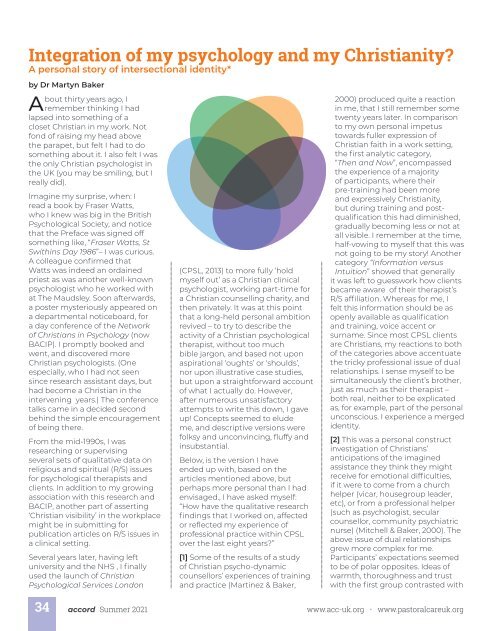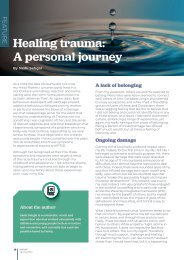ACC Accord Summer 2021 Issue 111
Create successful ePaper yourself
Turn your PDF publications into a flip-book with our unique Google optimized e-Paper software.
Integration of my psychology and my Christianity?<br />
A personal story of intersectional identity*<br />
by Dr Martyn Baker<br />
About thirty years ago, I<br />
remember thinking I had<br />
lapsed into something of a<br />
closet Christian in my work. Not<br />
fond of raising my head above<br />
the parapet, but felt I had to do<br />
something about it. I also felt I was<br />
the only Christian psychologist in<br />
the UK (you may be smiling, but I<br />
really did).<br />
Imagine my surprise, when: I<br />
read a book by Fraser Watts,<br />
who I knew was big in the British<br />
Psychological Society, and notice<br />
that the Preface was signed off<br />
something like, “Fraser Watts, St<br />
Swithins Day 1986”– I was curious.<br />
A colleague confirmed that<br />
Watts was indeed an ordained<br />
priest as was another well-known<br />
psychologist who he worked with<br />
at The Maudsley. Soon afterwards,<br />
a poster mysteriously appeared on<br />
a departmental noticeboard, for<br />
a day conference of the Network<br />
of Christians in Psychology (now<br />
BACIP). I promptly booked and<br />
went, and discovered more<br />
Christian psychologists. (One<br />
especially, who I had not seen<br />
since research assistant days, but<br />
had become a Christian in the<br />
intervening years.) The conference<br />
talks came in a decided second<br />
behind the simple encouragement<br />
of being there.<br />
From the mid-1990s, I was<br />
researching or supervising<br />
several sets of qualitative data on<br />
religious and spiritual (R/S) issues<br />
for psychological therapists and<br />
clients. In addition to my growing<br />
association with this research and<br />
BACIP, another part of asserting<br />
‘Christian visibility’ in the workplace<br />
might be in submitting for<br />
publication articles on R/S issues in<br />
a clinical setting.<br />
Several years later, having left<br />
university and the NHS , I finally<br />
used the launch of Christian<br />
Psychological Services London<br />
(CPSL, 2013) to more fully ‘hold<br />
myself out’ as a Christian clinical<br />
psychologist, working part-time for<br />
a Christian counselling charity, and<br />
then privately. It was at this point<br />
that a long-held personal ambition<br />
revived – to try to describe the<br />
activity of a Christian psychological<br />
therapist, without too much<br />
bible jargon, and based not upon<br />
aspirational ‘oughts’ or ‘shoulds’,<br />
nor upon illustrative case studies,<br />
but upon a straightforward account<br />
of what I actually do. However,<br />
after numerous unsatisfactory<br />
attempts to write this down, I gave<br />
up! Concepts seemed to elude<br />
me, and descriptive versions were<br />
folksy and unconvincing, fluffy and<br />
insubstantial.<br />
Below, is the version I have<br />
ended up with, based on the<br />
articles mentioned above, but<br />
perhaps more personal than I had<br />
envisaged., I have asked myself:<br />
“How have the qualitative research<br />
findings that I worked on, affected<br />
or reflected my experience of<br />
professional practice within CPSL<br />
over the last eight years?”<br />
[1] Some of the results of a study<br />
of Christian psycho-dynamic<br />
counsellors’ experiences of training<br />
and practice (Martinez & Baker,<br />
2000) produced quite a reaction<br />
in me, that I still remember some<br />
twenty years later. In comparison<br />
to my own personal impetus<br />
towards fuller expression of<br />
Christian faith in a work setting,<br />
the first analytic category,<br />
“Then and Now”, encompassed<br />
the experience of a majority<br />
of participants, where their<br />
pre-training had been more<br />
and expressively Christianity,<br />
but during training and postqualification<br />
this had diminished,<br />
gradually becoming less or not at<br />
all visible. I remember at the time,<br />
half-vowing to myself that this was<br />
not going to be my story! Another<br />
category “Information versus<br />
Intuition” showed that generally<br />
it was left to guesswork how clients<br />
became aware of their therapist’s<br />
R/S affiliation. Whereas for me, I<br />
felt this information should be as<br />
openly available as qualification<br />
and training, voice accent or<br />
surname. Since most CPSL clients<br />
are Christians, my reactions to both<br />
of the categories above accentuate<br />
the tricky professional issue of dual<br />
relationships. I sense myself to be<br />
simultaneously the client’s brother,<br />
just as much as their therapist –<br />
both real, neither to be explicated<br />
as, for example, part of the personal<br />
unconscious. I experience a merged<br />
identity.<br />
[2] This was a personal construct<br />
investigation of Christians’<br />
anticipations of the imagined<br />
assistance they think they might<br />
receive for emotional difficulties,<br />
if it were to come from a church<br />
helper (vicar, housegroup leader,<br />
etc), or from a professional helper<br />
(such as psychologist, secular<br />
counsellor, community psychiatric<br />
nurse) (Mitchell & Baker, 2000). The<br />
above issue of dual relationships<br />
grew more complex for me.<br />
Participants’ expectations seemed<br />
to be of polar opposites. Ideas of<br />
warmth, thoroughness and trust<br />
with the first group contrasted with<br />
34 accord <strong>Summer</strong> <strong>2021</strong> www.acc-uk.org • www.pastoralcareuk.org



